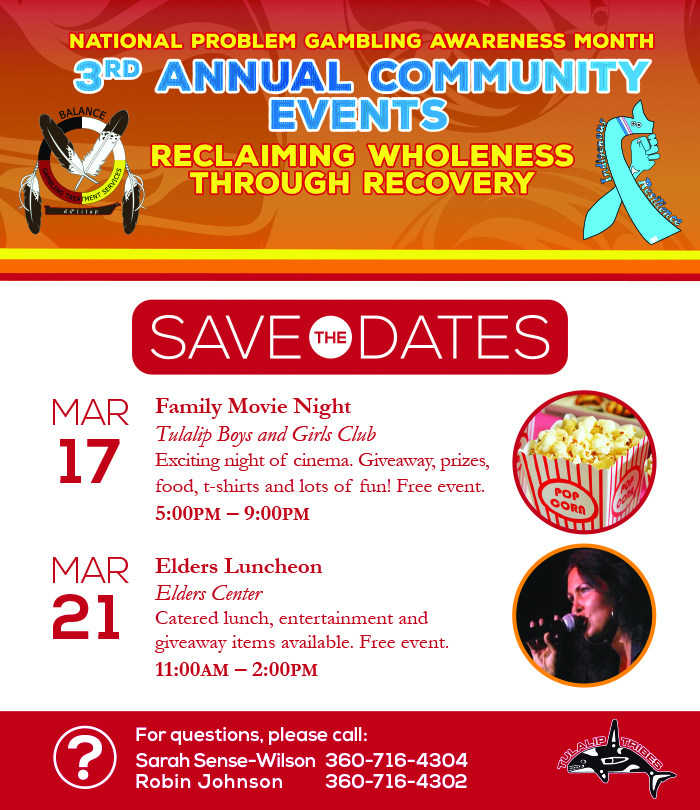Submitted by Sarah Sense-Wilson, Problem Gambling Coordinator, Tulalip Family Services
Why Can’t They Just Stop?
Most people with gambling problems slowly lose control over how much time and money they spend gambling. They focus only on gambling and ignore other responsibilities and the harm their gambling causes. Some people who gamble excessively do not connect their life problems to their gambling. Others have tried to cut down or stop before, but have failed. Now they feel irritable and upset whenever they try to change.
Most people who gamble excessively have mixed feelings about gambling. They know they are causing problems for the people they love. They may become anxious and unhappy, and often hate themselves. But the urge to gamble is too great to resist. They feel they can’t give up on all the time, money and emotion they have put into gambling. They can’t accept that they will never win back what they have lost.
Other people promise to quit, but can’t. They fear their loved ones will find them out. This drives them deeper into hiding and further into debt. They keep hoping a big win will end their problems. The first step for people with gambling problems is to give up on their losses and their hope of a big win. Then they can begin to regain control over their gambling and their lives.
Impact on Families
You probably already know how much gambling can hurt families. Families may be affected in different ways. Gambling problems can be hidden for a long time, so many families are shocked when they learn how much money has been lost. Some relationships do not survive a gambling problem. Other families struggle through difficulties and grow stronger together. People can and do recover from problem gambling, but it takes time and patience to work through all the issues. Don’t make important decisions about your relationship while you are under stress. Take time to think things through, and consider the feelings and needs of the whole family. Counselling can help you explore your options and decide what will work best for you and your family.
How are families affected?
Money Problems- The most common problem is the loss of money. Savings, property or belongings may suddenly be lost. This kind of money crisis makes the family feel scared, angry and betrayed.
Emotional Problems and Isolation
Gambling problems cause strong feelings. Family members may feel ashamed, hurt, afraid, angry, confused and distrustful. These feelings make it harder to solve problems. The person who gambles may even deny that there is a problem.
Isolation is another problem:
- Many partners do not want to be emotionally or physically close with the person who has hurt them.
- Many people affected by gambling problems avoid other people, because they feel ashamed. This makes it hard to get love and support.
- Friendships may end because of unpaid debts.
Physical and Mental Health
The stress of gambling problems sometimes causes health problems, for both the person who gambles and the family. This can include anxiety, depression and stress-related problems such as poor sleep, ulcers, bowel problems, headaches and muscle pains.
Burnout
Many families under stress have trouble coping. One member may try to keep things in control by taking on more tasks. This can lead to burnout. Family members often focus on the person with gambling problems, and forget to take care of themselves or to have fun.
Impact on Children
When a parent or caregiver has a gambling problem, children can feel forgotten, depressed and angry. They may believe they caused the problem and that, if they are “good,” the problem will stop. Some children take care of younger brothers or sisters, or try to support their parent. This responsibility causes children stress.
Children may also believe they must take sides between their parents. They may stop trusting a parent who makes promises he or she doesn’t keep. They may steal from the parent or get in trouble at school. Some children may try to draw attention away from the parent with the gambling problem, by:
- using alcohol or other drugs
- gambling
- breaking the law.
It is important to help children understand that the family’s problems are not their fault. Children need to return to a safe and balanced home life and a normal childhood. Family or individual counselling can help children deal with these changes. Family members often over focus on the person with the addiction and forget to take care themselves.
Physical and Emotional Abuse
Family violence is more common when families are in crisis. Gambling problems can lead to physical or emotional abuse of a partner, elder parent or child. Children may be hurt due to pent-up anger or neglect. If this is happening in your family, get help right away.
Anxiety and Depression
Stress, anxiety and depression are common both for people with gambling problems and for their families. This can make sleeping, thinking and solving problems more difficult. If you have some of the following symptoms for more than two weeks, making your day-to-day life difficult, you may have a major depression:
- You have lost interest in usual activities.
- You feel depressed, down or irritable.
- Your sleep has changed (e.g., you have problems falling asleep or staying asleep, or you sleep too much).
- Your appetite has changed. You have lost or gained weight.
- You feel helpless, hopeless or despairing.
- It is hard to think and to remember things, and your thoughts seem slower.
- You go over and over guilty feelings. You can’t stop thinking about problems.
- You have lost interest in sex.
- You feel physically tired, slow and heavy; or you feel restless and jumpy.
- You feel angry.
- You think about suicide.
If you have any of these difficulties, speak to your family doctor, counselor or mental health professional. Tell him or her about the gambling problem too. Treatment may include medications and/or counselling and other support.
Suicide Risk
Rates of suicide are higher for people who gamble excessively, and for their family members. The people most likely to attempt suicide are those who also have a mental health problem (such as depression) or who use alcohol or other drugs. People who have threatened suicide or hurt themselves in the past are also more at risk.
If you feel suicidal or are making plans to end your life, get help right away. You don’t have to deal with your problems alone.
Please contact Sarah Sense-Wilson for more information about Problem Gambling services and support at (360) 716-4304 or Washington State Helpline 1-800-547-6133


